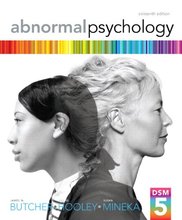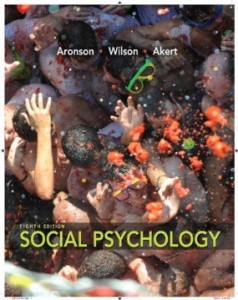Description
Abnormal Psychology
Abnormal Psychology Butcher Hooley Mineka
Abnormal Psychology Butcher Hooley Mineka 16th
Abnormal Psychology Butcher Hooley Mineka 16th Test Bank
Abnormal Psychology Butcher 16th Edition Test Bank
***THIS IS NOT THE ACTUAL BOOK. YOU ARE BUYING the Test Bank in e-version of the following book***
Name: Abnormal Psychology
Author: Butcher Hooley Mineka
Edition: 16th
ISBN-10: 0205944280
Type: Test Bank
– The test bank is what most professors use an a reference when making exams for their students, which means there’s a very high chance that you will see a very similar, if not exact the exact, question in the test!
– The file is either in pdf, doc, rtf or zipped in the package and can easily be read on PCs and Macs.
– Delivery is INSTANT. You can download the files IMMEDIATELY once payment is done.
If you have any questions, please feel free to contact us. Our response is the fastest. All questions will always be answered in 6 hours., most of the time within 30mins
We also faced similar difficulities when we were students, and we understand how you feel.
But now, with the Abnormal Psychology 16th Test Bank, you will be able to
* Anticipate the type of the questions that will appear in your exam.
* Reduces the hassle and stress of your student life.
* Improve your studying and also get a better grade!
* Get prepared for examination questions.
* Can save you time and help you understand the material.
This is the quality of service we are providing and we hope to be your helper.
Delivery is in the next moment. Test Bank is accurate.
Prepare to receive your Abnormal Psychology 16th Test Bank in the next moment.
ISBN-10: 0205944280
If you have any questions, or would like a receive a sample chapter before your purchase, please contact us at inquiry@testbankcorp.com
Abnormal Psychology
Abnormal Psychology Butcher Hooley Mineka
Abnormal Psychology Butcher Hooley Mineka 16th
Abnormal Psychology Butcher Hooley Mineka 16th Test Bank
Abnormal Psychology Butcher 16th Edition Test Bank
Chapter 1: Abnormal Psychology: An Overview
Multiple-Choice Questions
1.1-1. Which of the following is an example of family aggregation?
a. Both Jane and her husband are alcoholic.
b. Jim and John, 21-year-old twins, are both schizophrenic.
c. Karen, her mother, and her grandmother all have been diagnosed with
generalized anxiety disorder.
d. Kim’s suicide was apparently a reaction to her mother’s abuse.
Difficulty: 2
Question ID: 1.1-1
Page Ref: 2
Topic: Abnormal Psychology:An Overview
Skill: Applied
Answer: c. Karen, her mother, and her grandmother all have been diagnosed with
generalized anxiety disorder.
1.1-2. What does Monique’s case best illustrate?
a. Most individuals with mental disorders are violent.
b. Women are more likely to commit suicide than men.
c. Most individuals who experience a mental breakdown are clearly unwell long
before treatment is sought.
d. Mental illness can have a significant impact on one’s life.
Difficulty: 1
Question ID: 1.1- 2
Page Ref: 2
Topic: Abnormal Psychology:An Overview
Skill: Conceptual
Answer: d. Mental illness can have a significant impact on one’s life.
1.1-3. What does Monique’s case best illustrate?
a. Abnormal behavior usually produces more distress in others than the person
who engages in the abnormal behavior.
b. Abnormal behavior covers a wide range of behavioral disturbances.
c. Most people who suffer from abnormal behavior are quickly identified as
deviant by other people.
d. When people suffer from mental disorders, they are unable to work or live
independently.
Difficulty: 1
Question ID: 1.1-3
Page Ref: 2
Topic: Abnormal Psychology:An Overview
Skill: Conceptual
Answer: b. Abnormal behavior covers a wide range of behavioral disturbances.
1.1-4. What makes defining abnormality difficult?
a. There are so many types of abnormal behavior that they can’t be accurately
described.
b. There is no one behavior that serves to make someone abnormal.
c. Most of us are abnormal much of the time so that we cannot tell what is normal.
d. Criteria for abnormality have yet to be developed.
Difficulty: 2
Question ID: 1.1-4
Page Ref: 3
Topic: What Do We Mean by Abnormality?
Skill: Factual
Answer: b. There is no one behavior that serves to make someone abnormal.
1.1-5. Which of the following is a sufficient element to determine abnormality?
a. Suffering
b. Maladaptiveness
c. Deviancy
d. There is no single sufficient element.
Difficulty: 2
Question ID: 1.1-5
Page Ref: 3
Topic: What Do We Mean by Abnormality?
Skill: Factual
Answer: d. There is no single sufficient element.
1.1-6. The fact that body piercings are commonplace today while they would once
have been viewed as abnormal illustrates that
a. modern society is always open to change.
b. what is acceptable for men and women is no longer different.
c. American culture values independence.
d. the values of a society may change over time.
Difficulty: 2
Question ID: 1.1-6
Page Ref: 5
Topic: What Do We Mean by Abnormality?
Skill: Conceptual
Answer: d. the values of a society may change over time.
1.1-7. Brett persistently injects himself with pain killers. This has greatly increased
his chance of overdosing and dying. His behavior harms no one else. According to
the DSM, is Brett’s behavior consistent with the definition of a mental disorder?
a. Yes, because very few people in society engage in this behavior.
b. Yes, because he is persistentlyacting in a way that harms him.
c. No, because his behavior must also harm the well-being of others in the
community.
d. No, because there is no evidence that his actions are out of his own control.
Difficulty: 3
Question ID: 1.1-7
Page Ref: 4
Topic: What Do We Mean by Abnormality?
Skill: Applied
Answer: b. Yes, because he is persistently acting in a way that harms him.
1.1-8. According to the DSM, when is deviant behavior viewed as indicative of a
mental disorder?
a. Always
b. Only when the behavior is inconsistent with cultural norms
c. When it is a symptom of a dysfunction in the individual
d. Never
Difficulty: 1
Question ID: 1.1-8
Page Ref: 7
Topic: What Do We Mean by Abnormality?
Skill: Factual
Answer: c. When it is a symptom of a dysfunction in the individual
1.1-9. In the field of abnormal psychology, what does DSM stand for?
a. Disorders, Science, and the Mind
b. Diagnostic and Statistical Manual
c. Descriptors for the Science of the Mind
d. Diagnostic Science of the Mind
Difficulty: 1
Question ID: 1.1-9
Page Ref: 5
Topic: What Do We Mean by Abnormality?
Skill: Factual
Answer: b. Diagnostic and Statistical Manual
1.1-10. Which of the following is included in the DSM?
a. A discussion of the variouscauses of mental disorders
b. A means of identifying different mental disorders
c. A description of all conditions for mental illness
d. A description of all of the possible treatments for each disorder
Difficulty: 1
Question ID: 1.1-10
Page Ref: 5
Topic: What Do We Mean by Abnormality?
Skill: Applied
Answer: b. A means of identifying different mental disorders
1.1-11. In the United States, the standard for defining types of mental disorders is
contained in the
a. American PsychologicalAssociation’s bylaws.
b. American Psychiatric Association’s bylaws.
c. World Health Organization’s classification code.
d. Diagnostic and Statistical Manual of Mental Disorders.
Difficulty: 1
Question ID: 1.1-11
Page Ref: 5
Topic: What Do We Mean by Abnormality?
Skill: Factual
Answer: d. Diagnostic and Statistical Manual of Mental Disorders.
1.1-12. Which of the following best describes the DSM?
a. A complete guide to the origin, diagnosis and treatment of mental disorders
b. A work in progress that classifies mental disorders based on what is currently
known
c. A fundamentally flawed collection of unfounded assumptions about mental
disorders
d. An objective guide to diagnosing mental disorders
Difficulty: 2
Question ID: 1.1-12
Page Ref: 7
Topic: What Do We Mean by Abnormality?
Skill: Conceptual
Answer: b. A work in progress that classifies mental disorders based on what is currently
known
1.1-13. According to the case study in the textbook, for Zell Kravinsky the burden of
_______ was almost unbearable.
a. hoarding personal possessions
b. washing his hands compulsively c. refusing to help others d. writing and rewriting letters to his family Difficulty: 1
Question ID: 1.1-13
Page Ref: 6
Topic: What Do We Mean by Abnormality?
Skill: Factual
Answer: c. refusing to help others.
1.1-14. What is a reason for classifying mental disorders?
a. A classification system allowsinformation to be organized.
b. Then professionals won’t need to look at as much information about a person.
c. Then professionals can make assumptions about people based on their
diagnosis.
d. The diagnosis then often has an effect on peoples’ behaviors.
Difficulty: 1
Question ID: 1.1-14
Page Ref: 7
Topic: What Do We Mean by Abnormality?
Skill: Factual
Answer: a. A classification system allowsinformation to be organized.
1.1-15. Which concept provides psychologists witha consistent naming system that
can be used to organize and identify information in a helpful manner?
a. Epidemiology
b. Classification
c. Brain research
d. Labeling
Difficulty: 1
Question ID: 1.1-15
Page Ref: 7
Topic: What Do We Mean by Abnormality?
Skill: Conceptual
Answer: b. Classification
1.1-16. Which of the following is a disadvantage of having a classification system for
mental disorders?
a. A classification system establishes the types of problems that mental
professionals can treat.
b. When a label is used to describe an individual’s behavior, information about the
person is lost.
c. A classification system allows for research to advance.
d. Identifying the disorder that anindividual has guides treatment.
Difficulty: 1
Question ID: 1.1-16
Page Ref: 8
Topic: What Do We Mean by Abnormality?
Skill: Conceptual
Answer: b. When a label is used to describe anindividual’s behavior, information about
the person is lost.
1.1-17. Which of the following statements is true concerning classification systems
for mental disorders?
a. It is far more important that they be reliable than it is for them to be valid.
b. Classification systems make it more difficult to gather statistics on the
incidence and prevalence of disorders.
c. Classification systems meet the needs of medical insurance companies who
need diagnoses in order to authorize payment of claims.
d. Although they assist scientists who are researching disorders, they inhibit our
ability to communicate about abnormal behavior in a consistent way.
Difficulty: 2
Question ID: 1.1-17
Page Ref: 7
Topic: What Do We Mean by Abnormality?
Skill: Conceptual
Answer: c. Classification systems meet the needs of medical insurance companies who
need diagnoses in order to authorize payment of claims.
1.1-18. All of the following are disadvantages of classifying and diagnosing mental
disorders EXCEPT
a. stereotyping.
b. labeling.
c. stigma.
d. structure.
Difficulty: 1
Question ID: 1.1-18
Page Ref: 8
Topic: What Do We Mean by Abnormality?
Skill: Factual
Answer: d. structure.
1.1-19. Stereotyping is an example of the stigma of mental illness. It means
a. people are reluctant to discuss their psychological problems because they are
afraid others won’t like them.
b. people feel very sad and upset when theyfind out they have a mental illness.
c. the automatic and often incorrect beliefspeople have about people with mental
illness.
d. the problem of removing the diagnosis,even if people make a full recovery
from mental illness.
Difficulty: 1
Question ID: 1.1-19
Page Ref: 8
Topic: What Do We Mean by Abnormality?
Skill: Factual
Answer: c. the automatic and often incorrect beliefs people have about people with
mental illness.
1.1-20. What is wrong with describing someone as being “schizophrenic”?
a. It implies someone is depressed.
b. Such a definitive diagnosis is rare.
c. The behavior of the schizophrenic changes so rapidly that this is only true a
small percentage of the time.
d. Labels should be applied todisorders, not to people.
Difficulty: 2
Question ID: 1.1-20
Page Ref: 8
Topic: What Do We Mean by Abnormality?
Skill: Conceptual







Reviews
There are no reviews yet.